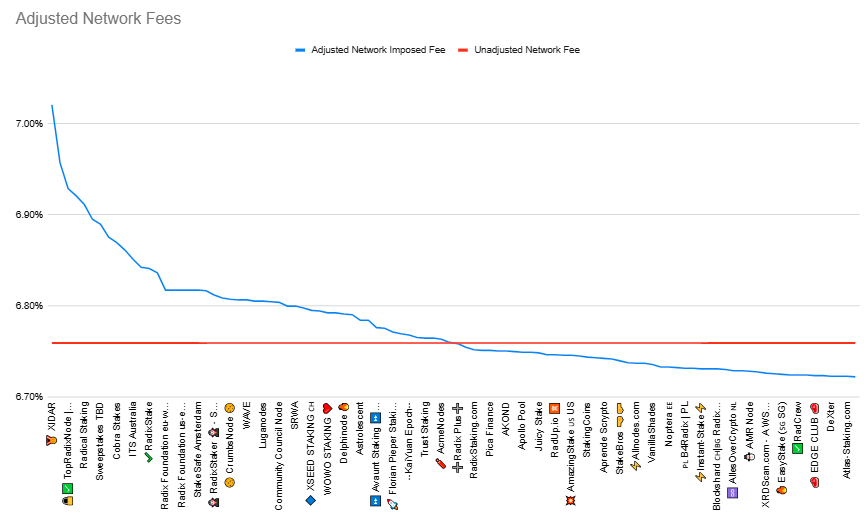Hi All,
Recently the XIDAR validator team raised a proposal in the RDX Works Discord, to suggest a protocol enforced minimum owners fee of 10% across the entire validator set. The basis of the proposal was to remove the burden of paying a subsidy from the RDX Team and instead pass this onto the staking community through fees. XIDAR’s proposal can be found here: XIDAR Proposal
Off the back of this, I have written a draft proposal that aims to achieve the same result (i.e removing the validator subsidy), but does so in a way which also rebalances stake over time and ensures that all validators receive a subsidy through a network imposed fee.
The full proposal can be found here: REP - Dynamically Adjusted & Weighted Network Fee
And for those who haven’t got the patience to read it in it’s entirety, here’s a tl;dr -
![]() Introduce a network imposed fee which is calculated every epoch (5 mins)
Introduce a network imposed fee which is calculated every epoch (5 mins)
![]() The fee is weighted depending on how far a validator’s stake deviates from the median stake value. In doing so, this should gradually rebalance validator stake around the average, as stakers seek out lower fees.
The fee is weighted depending on how far a validator’s stake deviates from the median stake value. In doing so, this should gradually rebalance validator stake around the average, as stakers seek out lower fees.
![]() Owner fees remain as-is and can be defined by each validator. Total validator fees will consist of 2 elements: Owners Fee & Network Imposed Fee
Owner fees remain as-is and can be defined by each validator. Total validator fees will consist of 2 elements: Owners Fee & Network Imposed Fee
![]() A new on-ledger component will accrue the Network Imposed Fees and validators will be able to claim using their owner badge as proof (with or without a KYC badge as desired by RDX Works)
A new on-ledger component will accrue the Network Imposed Fees and validators will be able to claim using their owner badge as proof (with or without a KYC badge as desired by RDX Works)
![]() Based on current USD value of XRD, and the median stake of 0.7%, the following chart shows how the network imposed fee would vary across the validator set, in absolute terms the spread in fee is small (7.02% to 6.72%) but increases rapidly as a validators stake deviates from the median value:
Based on current USD value of XRD, and the median stake of 0.7%, the following chart shows how the network imposed fee would vary across the validator set, in absolute terms the spread in fee is small (7.02% to 6.72%) but increases rapidly as a validators stake deviates from the median value:
I welcome any comments on this proposal, either here in the thread or please feel free to request comment access on the document.
Thanks in advance,
Faraz (Radstakes)
